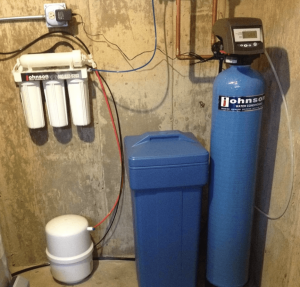What Happens If You Don’t Use Salt in Your Water Softener? A Pentair Water Softening Contractor in Orland Park, Illinois Explains

If you check your water softener and see no salt left in the tank, it is natural to ask if you can just leave it that way for a while. Below, this Pentair water softening contractor in Orland Park, Illinois is going to explain exactly what happens when your softener runs without salt.
Salt is not optional.
Water softeners use small resin beads to remove minerals like calcium and magnesium from your water. These beads are full of sodium at the start. As water flows through, the beads catch the hard minerals and replace them with sodium. This process is what ends up softening your water.
But when those resin beads become saturated with hard water minerals, they can no longer soften water effectively. To restore their function, the softener must undergo a regeneration cycle. In this cycle, the softener uses water and salt to make a brine that washes the minerals off the beads and sends them down the drain. The beads then get recharged with sodium and can start fresh again.
When you get a water softener installed by a Pentair water softening contractor in Orland Park, Illinois, this regeneration process is carefully calibrated so you always have soft water.
But what if your salt tank is empty? In that case, the softener may still initiate regeneration. But without salt in the tank, there is no brine, and the beads stay saturated with hard minerals. The water might still flow, but it will not be soft anymore.
Hard water comes back slowly.
You might not notice a change in the first few days without salt. But over time, the effects of hard water start to become more noticeable again.
Soap does not lather as effectively, your hands feel dry, and dishes come out spotted. Hard water also builds up inside your appliances, impacting water flow as well as the performance and efficiency of your appliances.
Maintaining salt in the tank is the best way to avoid these problems. Check the salt level every four to six weeks and add more when it runs low.
Salt-free systems are not the same.
Some systems are called “salt-free,” but they don’t truly soften water. They are conditioners. Instead of removing hard water minerals, they change how they behave so they don’t stick as easily.
Conditioners can reduce scale buildup, but the minerals remain in the water. In other words, you don’t get all the benefits of soft water.
So, while conditioners can be useful in some cases, they are not the same as water softeners. If you want real soft water, you need a softener that removes hard water minerals completely.
Did you miss a salt refill?
If your tank has been dry for a while, the resin beads inside your softener are not ruined. They are just full of hard water minerals.
Add salt until the tank is about two-thirds full, then run a manual regeneration cycle. The brine will clean out the beads and recharge them.
If you are not sure how to run that cycle, you can check your user manual or call a professional Pentair water softening contractor in Orland Park, Illinois. They will walk you through it or come by and reset the softener for you.
Once the regeneration is done, your softener should work normally again. Just keep the salt topped up to avoid the same problem in the future.
Looking for a Pentair Water Softening Contractor in Orland Park, Illinois?
Are you dealing with hard water symptoms, or just not sure how to keep your softener working properly? If so, and if you’re looking for a Pentair water softening contractor in Orland Park, Illinois who can help, Johnson Water Conditioning is the best choice. We offer free water testing and quality Pentair softeners for homes like yours. Contact us today to learn more.

 Better Water for
a Better Life
Better Water for
a Better Life
